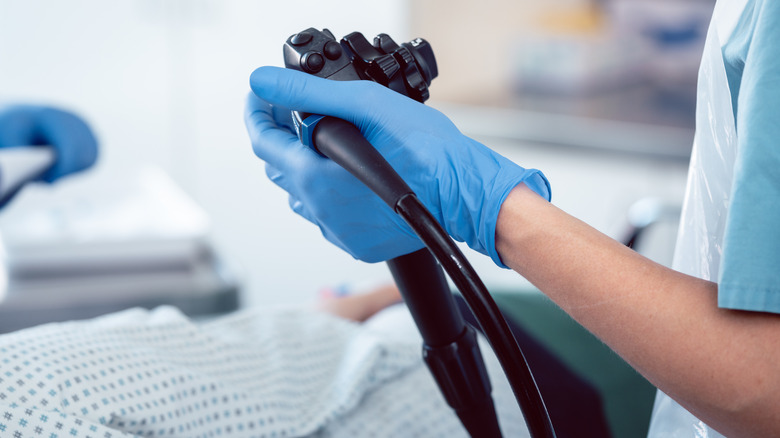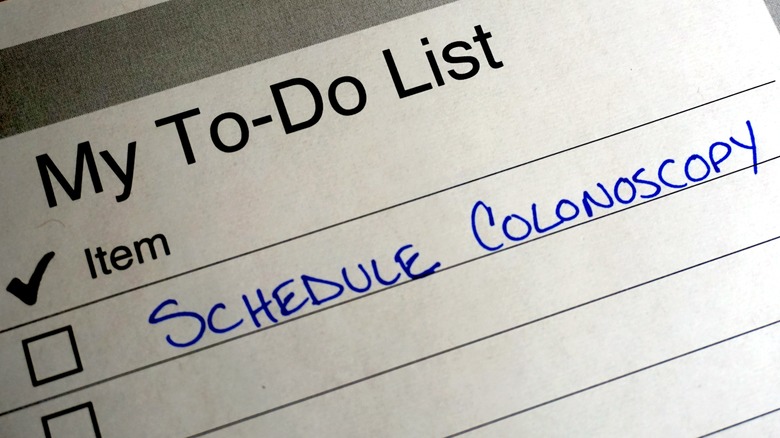Why Colonoscopies Starting At Age 45 Are Vital For Your Health - Exclusive
Colorectal cancer stands as the fourth leading cause of cancer-related deaths across the country, reports the U.S. Centers for Disease Control and Prevention (CDC). Additionally, according to the American Cancer Society, colorectal cancer ranks as the third leading cause of cancer-related death in both men and women.
In an exclusive interview with Health Digest, Dr. Xavier Llor, Medical Director, Cancer Screening and Prevention Program, Smilow Cancer; Colorectal Cancer Prevention Program; Digestive Health, Yale New Haven Health, explains the vital importance of colonoscopies as an early intervention strategy to help detect potential signs of colorectal cancer.
"A colonoscopy is a procedure to examine the colon (or large bowel) that also allows [doctors] to take biopsy samples to analyze and remove lesions, including polyps," Dr. Llor told Health Digest, explaining the nature of the procedure.
Most of the time, these early lesions that are left alone can evolve into a full-fledged cancer of the colo-rectum, according to Dr. Llor.
Why is it important to start colorectal screenings at age 45?
Although rates of colorectal cancer have been on the decline over the course of the last three decades, experts recommend that people begin colorectal screenings at an earlier age than previously advised. "The overall incidence of colorectal cancer has been steadily going down over the last 30 years in the US, in great part due to screening efforts," Dr. Llor told Health Digest. "At the same time, we have been seeing a very steady rise in the incidence among the younger (than age 50)." As a result, Dr. Llor explains that the recommended age for one's first colonoscopy has decreased by five years. "This alarming trend was incorporated in some modeling studies that ended up demonstrating the usefulness of decreasing the start of colorectal cancer screening to age 45," Dr. Llor shares.
Based on a patient's family history, he explains there are also cases in which one's first screening may be recommended earlier than age 45. "If a first-degree relative (parents, siblings) had colorectal cancer at an age earlier than 54, that would indicate screening before age 45, as the recommendation is to start screening 10 years before the age at diagnosis of the youngest relative with colorectal cancer," Dr. Llor said. He provides an example, stating, "If a relative had colorectal cancer at 48, the relatives would be recommended to start screening at 38. Finally, an identified cancer syndrome due to a genetic defect may prompt much earlier screening."
How often should someone get screened?
How often someone should return for their routine screenings will vary based on a variety of factors, Dr. Llor explains. "It depends on the screening modality used and the person's personal and family history," he told Health Digest.
Dr. Llor explains that based on the method used, routine screenings may be spaced anywhere from one year to 10 years apart. "Stool tests require screening yearly or every three years if using the multi-target stool test," he states. "CT colonography every 5 years; and colonoscopy could be up to 10 years, as long as the person does not have a family history of colorectal cancer and prior tests have not shown any polyps."
Data from the CDC shows that roughly seven out of 10 older adults ages 50 through 75 across the country keep up with their routine colorectal cancer screenings. Since changing the screening guidelines from age 50 to 45, the American Cancer Society reports that rates of colorectal cancer screenings were over twice as high amongst those ages 45 to 49 in the year following the guideline changes.
To learn more about Gastrointestinal Screenings and Prevention you can visit YaleNewHavenHealth.org.


